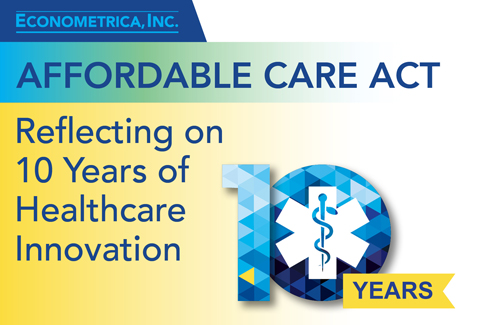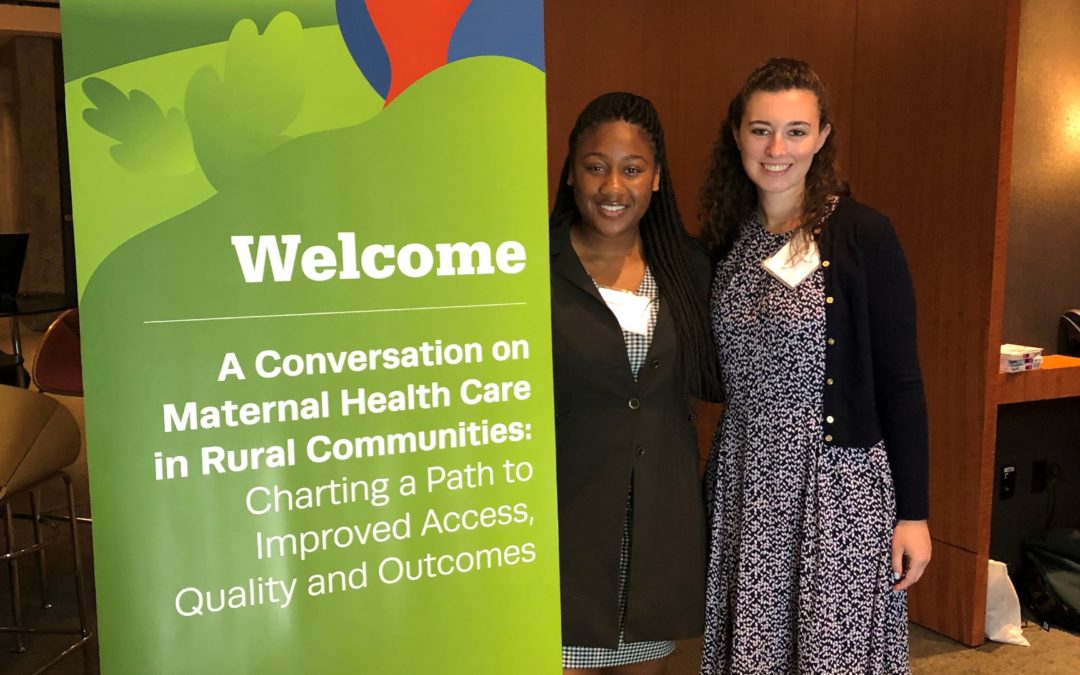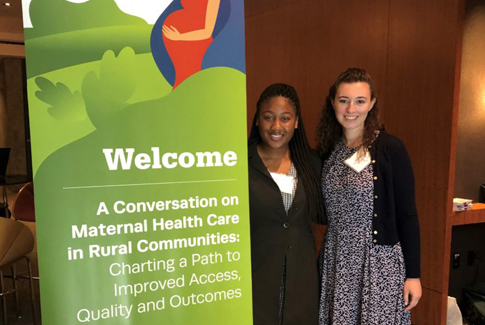No Results Found
The page you requested could not be found. Try refining your search, or use the navigation above to locate the post.

 BETHESDA, MD – On March 23, the Patient Protection and Affordable Care Act (ACA) celebrates its 10-year anniversary. A landmark body of legislation, the ACA has left a lasting impact on healthcare in the United States. One of the key tenets of the legislation highlights its dedication to original and novel solutions to healthcare challenges: the creation of the Center for Medicare and Medicaid Innovation (CMMI), also known as the Innovation Center within the Centers for Medicare & Medicaid Services (CMS). In the past decade, the Econometrica Team has engaged with several CMMI programs designed to improve quality of care while reducing costs. We mark this milestone by reflecting on the past 10 years of work in this space and looking forward to future innovations.
BETHESDA, MD – On March 23, the Patient Protection and Affordable Care Act (ACA) celebrates its 10-year anniversary. A landmark body of legislation, the ACA has left a lasting impact on healthcare in the United States. One of the key tenets of the legislation highlights its dedication to original and novel solutions to healthcare challenges: the creation of the Center for Medicare and Medicaid Innovation (CMMI), also known as the Innovation Center within the Centers for Medicare & Medicaid Services (CMS). In the past decade, the Econometrica Team has engaged with several CMMI programs designed to improve quality of care while reducing costs. We mark this milestone by reflecting on the past 10 years of work in this space and looking forward to future innovations.
Since its inception through CMMI, Econometrica has been influential in the success of the Hospital Innovation and Improvement Network initiative, formerly known as the Partnership for Patients initiative. This initiative seeks to improve healthcare safety and quality by reducing harm in hospitals and reducing readmissions through public–private partnerships. In the first iteration of the initiative, Econometrica served as the National Content Developer. In this role, Econometrica supported Hospital Engagement Networks in identifying, sharing, and celebrating innovations in care redesign that improved patient outcomes and reduced readmissions in key areas (e.g., adverse drug events, early elective deliveries). Econometrica served as the evaluator for the initiative and investigated the savings and improved patient outcomes for the first and second iteration of the model. We have supported the third iteration of the model through our work monitoring Patient and Family Engagement activities and providing evidence-based resources on how to expand the innovation.
Econometrica supported CMS on the Medicaid Incentives for Prevention of Chronic Diseases program by monitoring the program’s effectiveness and providing technical support to participants. The demonstration program tested the effectiveness of offering incentives to Medicaid beneficiaries who took part in prevention programs to address one of the following health behaviors or outcomes: curbing tobacco use, controlling or losing weight, lowering cholesterol or blood pressure, and avoiding the onset of diabetes or improving diabetes management. Econometrica supported the 10 States that received grants in implementing the program, created and put into action a learning system, collected performance data, and organized meetings for grantees.
Another of Econometrica’s early CMMI initiative-related evaluation projects was the Evaluation and Monitoring of the Bundled Payments for Care Improvement Model 1 Initiative, which connected payments for services provided to beneficiaries during an episode of care. Econometrica evaluated changes in service utilization patterns, patient case mix, incidence of harm, quality of care, changes in key health outcomes of patients, and Medicare expenditures, and collected primary qualitative data by interviewing participants. We designed and administered a Patient Health and Experience Survey to certain beneficiaries to understand their care experience. We are currently building on this work under our Learning System for Bundled Payments for Care Improvement Advanced Model contract, in which we are researching and recommending which quality measures to use to evaluate participant performance in the model, responding to help desk tickets, and assisting with a data feedback dashboard that monitors model performance.
Our other current work on CMMI initiatives includes engagements with the Million Hearts® and Comprehensive Primary Care Plus (CPC+) models. Million Hearts® aims to reduce the risk of cardiovascular disease and improve outcomes for people at risk of heart attacks and stroke. Econometrica assists with the program implementation by validating beneficiary eligibility for the program, tracking provider use, and creating payment files for claims processing for each beneficiary.
Our work on CPC+ falls into two projects that support the model, which seeks to improve primary care through regional transformations of care delivery and multi-payer reform. Econometrica produces a series of data extracts consisting of claims and administrative data, which are sent to more than 300 individual practices participating in CPC+. We also aggregate data extracts that are provided to four regional aggregators participating in CPC+.
We look forward to continuing to support CMS’ dedication to innovative models that promote the delivery of high-quality healthcare at reduced cost. Happy birthday, CMMI!
Founded in 1998, Econometrica is a research and management organization in Bethesda, MD, established to provide public- and private-sector clients with customized program support services. Econometrica works with multiple agencies to provide high-quality, cost-effective analyses, modeling, and economic evaluations. The company consistently receives exceptional scores from its clients and believes in three principles: technical capabilities, happy customers, and business development.
Econometrica has been influential in the success of the Hospital Innovation and Improvement Network initiative, formerly known as the Partnership for Patients initiative. This initiative seeks to improve healthcare safety and quality by reducing harm in hospitals and reducing readmissions through public–private partnerships.

 BETHESDA, MD – On March 13, President Trump declared a national emergency in response to the outbreak of coronavirus (COVID-19) nationwide. Econometrica, Inc., continues to monitor developments related to the coronavirus pandemic to ensure the safety of our staff, their families, and communities. We also are taking steps toward meeting our commitments to clients and partners and continue to provide the high-quality and timely services expected from Econometrica.
BETHESDA, MD – On March 13, President Trump declared a national emergency in response to the outbreak of coronavirus (COVID-19) nationwide. Econometrica, Inc., continues to monitor developments related to the coronavirus pandemic to ensure the safety of our staff, their families, and communities. We also are taking steps toward meeting our commitments to clients and partners and continue to provide the high-quality and timely services expected from Econometrica.
The following summarizes steps we have taken to date:
Coronavirus infections increase at an exponential rate, with symptoms including fever, cough, and shortness of breath. Social distancing seems to be effective in reducing the spread, and Econometrica wants its employees to feel safe and remain healthy. As this outbreak unfolds, Econometrica will continue to provide its high-quality services with no reduction in availability or commitment.
Founded in 1998, Econometrica is a research and management organization in Bethesda, MD, established to provide public- and private-sector clients with customized program support services. Econometrica works with multiple agencies to provide high-quality, cost-effective analyses, modeling, and economic evaluations. The company consistently receives exceptional scores from its clients and believes in three principles: technical capabilities, happy customers, and business development.
Coronavirus infections increase at an exponential rate, with symptoms including fever, cough, and shortness of breath. Social distancing seems to be effective in reducing the spread, and Econometrica wants its employees to feel safe and remain healthy.
The page you requested could not be found. Try refining your search, or use the navigation above to locate the post.

 The Health Group of Econometrica conducted a review of the Kidney Health Executive Order passed by President Trump on July 10, 2019 . This essential decision impacts programs operated by the Centers for Medicare & Medicaid Services (CMS), health providers, kidney patients, and the availability of resources dedicated to treatment . Econometrica is committed to staying informed of decisions like these to better serve the interests of our clients .
The Health Group of Econometrica conducted a review of the Kidney Health Executive Order passed by President Trump on July 10, 2019 . This essential decision impacts programs operated by the Centers for Medicare & Medicaid Services (CMS), health providers, kidney patients, and the availability of resources dedicated to treatment . Econometrica is committed to staying informed of decisions like these to better serve the interests of our clients .
Founded in 1998, Econometrica is a research and management organization in Bethesda, MD, established to provide public- and private-sector clients with customized program support services. Econometrica works with multiple agencies to provide high-quality, cost-effective analyses, modeling, and economic evaluations. The company consistently receives exceptional scores from its clients and believes in three principles: technical capabilities, happy customers, and business development.
Econometrica specializes in research and management across numerous industries in both the public and private sectors. We are always looking to hire the best and brightest in data science, health, grants management, energy, homeland security, housing and community development, capital markets and finance, and transportation. We work as the lead service provider and also as a capable outsource partner to other consultancies. To work with us on your next project, visit us online and email a member of our executive staff in your preferred specialty. To explore the benefits of working for us, visit our careers page.
The most common risk factors of CKD are diabetes, which causes kidney damage due to excess sugar, and high blood pressure, which can cause damage to the blood vessels in the kidneys over time.

 The Econometrica Team contributed to an important discussion on actionable ways to improve maternal health outcomes in rural areas.
The Econometrica Team contributed to an important discussion on actionable ways to improve maternal health outcomes in rural areas.
On June 12, Econometrica employees joined A Conversation on Maternal Health Care in Rural Communities: Charting a Path to Improved Access, Quality, and Outcomes, a collaborative forum hosted by the Center for Medicare & Medicaid Services (CMS) in conjunction with several of its partners. The event gathered providers, researchers, policymakers, professional society members, and other stakeholders to discuss the state of maternal healthcare in rural areas and identify key priority areas and action steps to improve outcomes.
The event consisted of panels featuring key leaders in the field as well as a working lunch. Attendees created a set of key priorities and action steps for solutions under categories such as health disparities, clinical/quality improvement, social determinants of health, payment, public education and public health, workforce, and legislation. The concluding facilitated discussion delved deeper into a few of the identified priorities to identify actionable steps towards improving outcomes.
Some of the key takeaways from the session were the broad racial, ethnic, and income inequities in terms of access and health outcomes in maternal health. One presenter explained that equity is more than just an open door—it means providing equitable, culturally conscious care to people with different needs once they get to facilities. Additionally, the social determinants of health are major drivers of health outcomes in rural areas. Community Health Workers and Community Health Extension Workers can have major impacts on rural populations working in conjunction with rural-based midwives. These human resources can help with the management of a number of chronic conditions that are prevalent in rural communities.
Many presenters and attendees emphasized the importance of expanding Medicaid at the State level in addressing rural health issues. Expanding Medicaid reimbursements for the cost of care is critical (e.g., by extending Medicaid to cover services through 12 months postpartum, exploring Alternative Payment Model options, and expanding Medicaid coverage to more services such as telemedicine and doulas). Providers also emphasized the need for open source data due to difficulties for rural hospitals in collecting their own data. Workforce training is another key opportunity to improve access to maternal healthcare through loan repayment opportunities and rural residency trainings that encourage rural inhabitants to train and remain in their hometowns to practice.
Econometrica is excited to be part of such a vibrant and productive conversation with so many key leaders in the field. It was a great day!
Founded in 1998, Econometrica is a research and management organization in Bethesda, MD, established to provide public- and private-sector clients with customized program support services. Econometrica works with multiple agencies to provide high-quality, cost-effective analyses, modeling, and economic evaluations. The company consistently receives exceptional scores from its clients and believes in three principles: technical capabilities, happy customers, and business development.
Econometrica will support Indiana University and the Industrial Heartland Project by providing expertise in qualitative research.

Established in 1998, Econometrica is an economic research and analysis firm located in Bethesda, MD, that provides research, data analytics, and management services to local, state, and federal government clients, including the U.S. Department of Housing and Urban Development (HUD) and its grantees. Econometrica is requesting qualifications from firms and individuals interested in participating in our application in response to HUD’s FY 2020 and FY 2021 Community Compass Technical Assistance and Capacity Building Program NOFA (Opportunity No. FR-6400-N-06).
For more information from HUD regarding the FY 2020 and FY 2021 NOFA, the full announcement is accessible at the following link: https://www.hud.gov/sites/dfiles/SPM/documents/HUD_FY2020andFY2021_ccta.pdf.
HUD’s NOFA invites competitive applications for 2 funding years, FY 2020 and FY 2021. Econometrica intends to request funding from both funding years.
The priority deadline has passed; however, Econometrica is now accepting applications on a continuous and rolling basis. Consultants and subcontractor firms with specialized skills and experience in the areas of economic development, affordable and assisted housing programs, community development, and disaster resilience and recovery are important members of our team. Experience with HUD data systems is a plus. Bilingual applicants are encouraged to apply. Please consider reviewing the application requirements and submitting a response to join our team.
In accordance with 2 CFR Part 200, Sections 200.317 through 200.326, Econometrica is providing in this RFQ a description of the technical requirements of functions to be performed or performance required, including the range of acceptable characteristics or minimum acceptable standards. The Community Compass initiative is designed to support HUD’s local and state grantees to address a range of challenges or obstacles to full program implementation. The goal of the technical assistance and capacity-building initiatives is to equip HUD’s grantees with the knowledge, skills, tools, organizational capacity, and systems to implement HUD programs and policies successfully and in compliance with state and federal rules, regulations, and program requirements. Therefore, Econometrica is searching for qualified firms and individuals who can provide experience and skills relevant to HUD programs, policies, systems, and initiatives. These programs, policies, systems, and initiatives include but are not limited to:
All submissions received will be reviewed against the following selection criteria:
All consultants will be selected in compliance with the procurement procedures and standards codified in 2 CFR 200. Selection of consultants will be competitive, as required by 2 CFR § 200.320.
The qualifications and experience of selected individual consultants or partner firms may be included in Econometrica’s application to the NOFA. Those included may also be asked to assist with contributing expert knowledge in areas of the application response.
The following instructions apply to the Experience Form (tab/worksheet 4) in Excel Workbook entitled “1.C. Applicant Summary, Interest, Capacity & Experience Workbook-REQUIRED”. REMEMBER you are ONLY required to complete the Experience Form. Econometrica as the Prime Applicant will complete the other tabs/worksheets.
Note: For each person listed, there are two steps to document years of experience:
For example, if Jane Doe has 5 years of experience with CDBG entitlements (2011–2016) and 8 years (2008–2016) with CDBG Disaster Recovery programs, the applicant would include 5 and 8 under the relevant program topics. Then, for the total years for the CDBG program, the applicant would include 8 years to represent unduplicated years. When entering the number of years of experience relevant to each program/topic, include only whole numbers; do not include text or decimals.
For this chart, 1 year means “10 months or more.” For instance, if a person has 9 months of experience, that person would be considered to have 0 years of experience, while a person with 5 years, 11 months of experience would be considered to have 6 years of experience.
Note: There are two columns under the Additional section that require a Yes or No response, rather than a numeric answer: the “Completed Administration and Rental Housing Compliance Certification courses” column and the “Bilingual (Spanish)” column.
Respondents are encouraged to submit questions about this RFQ in writing to: FY2020NOFA@EconometricaInc.com. Please use the subject line “Your Name – FY2020 NOFA Questions.”
Press contact: Jonathan Fusfield, JFusfield@EconometricaInc.com